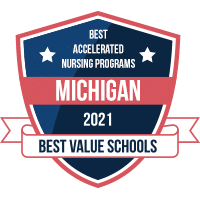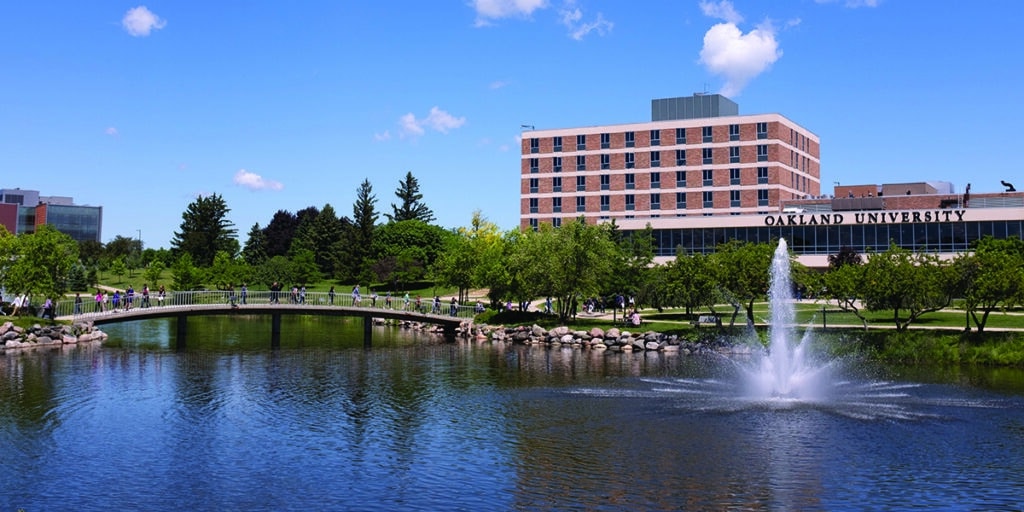
Now more than ever highly-qualified nurses are in high demand, in Michigan and across the country. As more data shows that patients have better outcomes when nurses hold a bachelor’s degree or higher, more healthcare organizations are pushing for nurses to obtain higher education. Registered nurses in Michigan earn an annual mean wage of $73,200.
What Is An Accelerated Nursing Program?
Accelerated nursing programs help registered nurses obtain a BSN or MSN in a shorter time span than traditional education pathways. Some of these programs are offered fully online or in a hybrid format to eliminate the time-consuming need to meet on campus. This is especially beneficial for students who are currently working. The most common types of accelerated programs are RN-to-BSN programs and the Second Degree BSN.
What Is A Second Degree BSN?
Second Degree BSN’s (also known as second career degrees) are designed for students already in possession of a bachelor’s degree in a different field, who would like to pursue a second bachelor’s degree in nursing. These programs accept some credits from the first degree to account for the second degree, thus shortening the amount of time needed to complete the BSN.
If you’re interested in other ways to earn a nursing degree online, please check out our degree finding tools and helpful articles.
We ranked 10 schools from across the state based on tuition, class size, and graduation rate. Each school offers at least an accelerated BSN program, with some colleges featuring more than one pathway. See our results below.
The Best 10 Value Accelerated Nursing Programs In Michigan
1. Andrews University – Berrien Springs – 80 Points
Andrews University is a private Christian university affiliated with the Seventh Day Adventist Church. They offer an interactive online RN-to-BSN program that may be completed within 2 years. Students with an associate’s degree may transfer in credits. Admissions are accepted year-round with entry dates in August, January, and May.
- Tuition: $4,980 per semester
- Graduation Rate: 59%
2. University of Michigan-Flint – Flint – 72 Points
The School of Nursing at the University of Michigan – Flint is open to students with a previous regionally-accredited bachelor’s degree, active military, and veterans. This concentrated 16-month program is full-time with a clinical requirement. Some courses may be taken online, but the majority are on campus.
- Tuition: $3,591 per semester
- Graduation Rate: 40%
3. Wayne State University – Detroit – 68 Points
Wayne State University features a BSN Second Career/Degree (CD2) program. Admissions occur once a year in the spring-summer semester. Learning takes place on campus with clinical experiences across the Detroit area. Students will attend a total of five semesters including clinicals, through all four seasons, to complete the degree in approximately 1.5 years.
- Tuition: $4,764 per semester
- Graduation Rate: 48%
4. Concordia University Ann Arbor – Ann Arbor – 54 Points
Concordia University Ann Arbor is a Christian university associated with the Lutheran Church – Missouri Synod. The school offers an accelerated RN-to-BSN program for associate’s-level students needing to finish their BSN degree. A good fit for currently-employed students, students can attend completely online.
- Tuition: $5,400 per semester
- Graduation Rate: 39%
4. Oakland University – Rochester Hills – 54 Points

Described as an intensive, full-time track, the Accelerated Second-Degree BSN Track at Oakland University can graduate students within 4 semesters. Clinical experiences take place throughout Southeastern Michigan. Didactic coursework is taught on campus at the Anton/Frankel Center in Mt. Clemens.
- Tuition: $5,591 per semester
- Graduation Rate: 91-93%
5. Grand Valley State University – Allendale – 50 Points
Grand Valley State University offers an RN-to-BSN program with online and hybrid courses. Students from outside Michigan are welcome to apply, as the school has partnerships with 9 other states as well as Washington D.C. Students can complete this program in as little as 16 months with the correct prerequisites.
- Tuition: $6,602 per semester
- Graduation Rate: 67%
6. Davenport University – Grand Rapids – 44 Points
The BSN Completion/Concurrent program at Davenport University accepts current associate’s students as well as currently-employed RNs. The Completion pathway for RNs is offered fully online, though students may also attend on-campus at a partner school in their area. The Concurrent pathway is for students currently in an ADN program at a local community college, allowing them to begin taking BSN level courses a year in advance.
- Tuition: $9,660 per semester
- Graduation Rate: 49%
6. Madonna University – Livonia – 44 Points
Madonna University is a private Catholic university offering a 16-month accelerated BSN. Admission requirements are similar to a Second Degree program, with applicants needing a confirmed bachelor’s degree with a cumulative GPA of 2.8. Students may start in January, May, and August. Coursework is online with clinical placements through Ascension Michigan.
- Tuition: $11,748 per semester
- Graduation Rate: 60%
7. University of Detroit Mercy – Detroit – 38 Points
The University of Detroit Mercy is the largest Catholic university in Michigan. The school offers a Second Degree Option (SDO) BSN track for students with a bachelor’s degree in another field of study. The program is 16-months in length with students completing coursework and clinical rotations year-round. Cohorts for the SDO track begin each fall and winter.
- Average Tuition per semester: $14,632 (before academic grants/scholarships)
- Graduation Rate: 90-100%
8. Michigan State University – East Lansing – 36 Points
The Accelerated Second Degree program at Michigan State University can be completed within 15 months for qualified full-time students. The program begins in May and will conclude the following August. Classes are held at the MSU campus in East Lansing and at Detroit Medical Center in Detroit.
- Tuition: $14,524 per semester
- Graduation Rate: 81%
Discover more accelerated nursing degree options with our degree finding tools and best value articles!
Our Ranking Methodology
Schools on our list were ranked in three categories: estimated in-state tuition per semester, student-faculty ratio, and graduation rate. Tuition accounted for 60% of the rank with data obtained directly from the school’s website. Student-Faculty ratio and graduation rate accounted for 20% each, with both sets of information obtained from the National Center for Education Statistics.
Reporting Errors
We strive to be as accurate as possible with our data. Employees of the schools mentioned above may reach out to us to report errors. We will make corrections as soon as possible.

